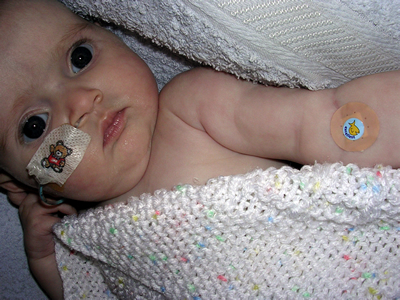
At GOSH they do a great range of really cute plasters. The other day when Jasmine had her bloods done the nurse put this cool plaster over her arm. It says ‘excellent’ on it and has a fish on it. Last time she had a mouse with ‘well done’. At each clinic now I run about asking all the kids what’s on their plasters.
So Jasmine’s blood pressure seems to be coming down. It is a slow process, but I guess that is the best way to do it, without stripping all the fluid and making her dehydrated. Tomorrow we will get our latest dialysis delivery and Jasmine will be getting new dialysate bags which have more calcium in them, as she is still not getting enough calcium and is taking what calcium she has from her bones. At the GOSH clinic they keep an eye on this by measuring her parathyroid hormone (PTH) levels in her blood.
If Jasmine’s PTH reading is too high, it means that she is taking calcium from her bones instead of using the calcium (serum) in her blood and other calcium ions. Normally, her kidneys, regulated by her PTH, would reabsorb calcium as they filter the blood and take vitamin D from her feed and convert it to an active form of vitamin D, which helps absorb calcium. But because her kidneys don’t work, Jasmine gets an active form of vitamin D in medicine form every morning called 1 alpha calcidol which does the job for her.
She also gets calcium acetate with every feed so that it binds with the phosphates in her milk and gets rid of them in her urine. Normally, her PTH would help her kidneys to regulate phosphate reabsorption but since they don’t, the calcium acetate does it for her. It is a balancing act though, giving her too much calcium can lead to other complications, so that is why her PTH and calcium levels (serum and ions) are measured at clinics.
It is amazing how much work the kidneys do, regulated by hormones, and even more amazing how many ways our medical team replace all the things Jasmine’s kidneys don’t do, so that she can grow well. We are in awe of, and very grateful for, their great skill and dedication.
[…] and her one-alpha vitamin D supplement has been decreased. The doctors are always closely monitoring these levels. This is a common problem with peritoneal dialysis, and is difficult to manage. Jasmine has to go […]